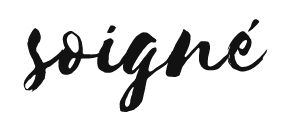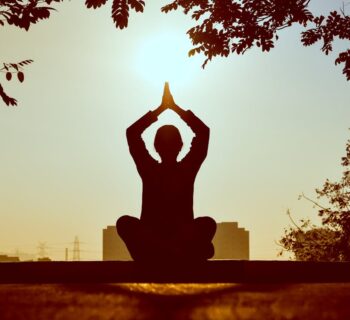It’s easy for me to rhapsodize about the way yoga has held me in my relationship with my body. Like so many of us from so many backgrounds, my early life taught me to experience my body as a source of shame, vulnerability, and discomfort. When I began practicing yoga in my early adulthood as part of eating disorder recovery, it gave me a new sense of my body as a source of vitality, joy, and strength. I especially loved that it bypassed my struggle to fix my “body image issues.” When I move and breathe, I feel viscerally that, in fact, my body isn’t an image—it’s me, an ever-changing reality to be experienced, not gazed at.
Yoga led me to spend the last twenty years trying to understand how we heal our relationships with our bodies. I became a psychotherapist. I sit with people day in and day out, supporting healing, self-discovery, and self-compassion. As a white, thin, Jewish woman and mother, my understanding is informed by my own privilege, perspective, and experiences of how I felt and feel I was supposed to look to fit in to belong and feel safe in today’s American culture. I invite my clients, too, to investigate how their own cultural experiences and experiences of oppression influence them. We talk a lot about how society influences body image, and inevitably I ask, how can *you* resist negative cultural messages?
But here is what I have learned over time—it is a rare person indeed who can resist all the cultural messages about bodies and all that lies within our beauty/health standards—sexism, racism, ableism, classism, concepts of privilege and power. Even some of the bravest, most resilient, most culture-resisting people I know share in private that their body image issues have not disappeared. I am one of those people. To be quite vulnerable, despite the fact that I have been immersed in the recovery, yoga, and body positivity worlds for all these years, I often notice societal messages zooming through my mind.
Because of this, I have come to believe that expecting perfect body image from ourselves is a setup, and one built on a major cultural trap: the idea that healing is an individual endeavor and an individual responsibility.
We are taught: If you are poor, it’s because *you* haven’t worked hard enough. If you have health problems, the cause is *your* lifestyle. If you have an eating disorder or body issues, well, that’s because *you* haven’t resisted the cultural messages enough. Which is just what you need—something else wrong with you that you should spend some money to fix.
Here’s where I come back to yoga: the ultimate aim of yoga is for liberation—individual and collective. Yet, in contemporary US culture, yoga can become zeroed in on individual healing. I am certainly guilty of using it this way—I wrote a whole book about yoga for healing. This approach has powerful gifts to offer, but I worry that when it is the only approach taken, it lets the culture off the hook. Most health problems owe far more to societal factors than individual.
How are we to heal as individuals in a culture that continues to cause harm? How are we to heal if we are taught that, on basis of size, race, gender, age, or ability, our bodies are only meant to be sources of shame, vulnerability and discomfort? How do we learn to trust ourselves when our thoughts—based on very real messages we have absorbed in an undistorted manner—are labeled as distorted?
I’m not going to stop supporting people in their individual healing because I know that work is crucial, too. The individual counts—our stories and voices matter. Eating disorders are not simply reactions to a toxic culture. People with eating disorders haven’t just failed worse than everyone else at resisting cultural messages. Eating disorders are illnesses with clear roots in genetics and life histories. Recovery must involve understanding and finding compassion for your unique temperament and biology in order to learn how to be a steadfast self-caretaker.
But for that inner work to flourish, we need to collectively change systems, not just people. Changing society will not cure eating disorders—but it sure would remove many of the obstacles that make recovery and healing so very hard.
Here are some tiny starting points for change:
- Change systems that perpetuate fatphobia and weight stigma: this means media-makers creating messaging that counters the boogie monster “obesity epidemic.” Doctors can educate medical schools and organizations about Health at Every SizeÒ. Eating disorder professionals like me can change the norms in our professional communities—to stop reassuring clients that they are not fat and won’t get fat, and replace that with the message: being fat is just fine, and let’s help you survive in a world that works hard to teach you otherwise.
- Expose the fact that most of our understanding of eating disorders and body image is based on research done by white, thin, privileged people about white, thin privileged people. Much of the research has been done by straight men, when the issue disproportionally affects women and LBGTQ people. Let’s fight for better research.
- Change systems based on fatphobia, racism, and classism that affect who has access to care. This means changing a system that only insures some of us, and underinsures even the most privileged. Vote! In professional communities, we can ask why our public health campaigns, diagnostic categories, and treatment centers send a message that only people with thin, white, young bodies are “sick enough” to merit treatment.
- In yoga communities, we can challenge the use of yoga to hoard thin-privilege and health-privilege, and teach yoga with a purpose—to fortify ourselves for real liberation work, for creating changes much bigger than our own bodies.
A final note—please know that it is never up to one person to heal the world. If you are stuck in an eating disorder or body image struggle, please focus on your individual healing, however you may find it. Let those of us who are not as stuck do some of the fighting until you are ready to join in. As yoga teaches us—we are all connected, our healing intimately bound up together. In the words of Emma Lazarus, “Until we are all free, we are none of us free.”
NOTE: This post is part of a collaborative media series organized and curated by Omstars and the Yoga & Body Image Coalition intended as a deep dive into yoga & body image
By Suzannah Neufeld
Suzannah Neufeld, MFT, C-IAYT, is a licensed psychotherapist, certified yoga therapist, and mom of two who has specialized in supporting people coping with eating disorders, body image concerns, and maternal mental health since 2003. She is a co-founder of Rockridge Wellness Center, a counseling and health collective in Oakland, CA, where she has a private practice. Suzannah is the author of the book Awake at 3 a.m.: Yoga Therapy for Anxiety and Depression in Pregnancy and Early Motherhood (Parallax Press, 2018). She is also a contributing author in the anthology Yoga Rising: 30 Empowering Stories from Yoga Renegades for Every Body. Learn more at www.suzannahneufeld.com










